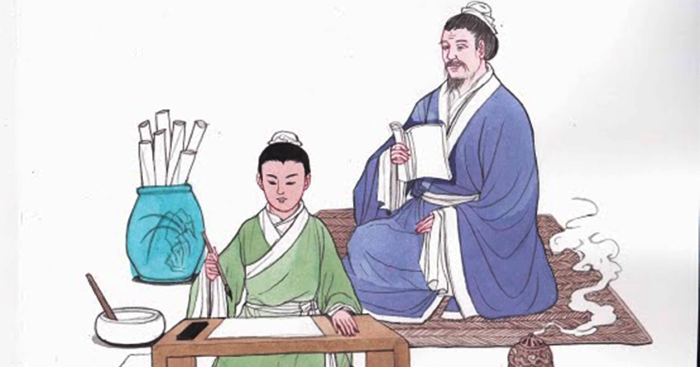In any relationship, we need to apply the “3-7 Law”, 3 parts for ourselves and 7 parts for others. The relationship between parents and children, if using this rule, will be much better.
So how exactly to raise children according to the “7 parts discipline, 3 parts indulgence” rule? Specifically:
7 parts discipline, 3 parts freedom
As parents, we should not only focus on the 7 parts of discipline in developing intelligence for our children.
Instead, let’s allocate 3 parts for children to freely play, develop life skills, foster imagination in nature, and cultivate creative abilities through experimentation.
Of course, the best place for children’s brain development is a warm family, the best nutrition is a sense of security, and the best education is the companionship of parents.
Placing a child in a normal living environment, if there are people who specialize in teaching them different languages, they will learn those languages; but if no one teaches them to read, they will not develop a reading habit, or even know how to read.
If you miss the opportunity to cultivate a reading habit in children, the development of all parts of their brain and their reading ability will be hindered.

Raising children according to the “7 parts discipline, 3 parts indulgence” rule can be applied in all aspects of life.
7 parts support, 3 parts self-motivation
When we are young, we need the love and support of our parents, the 7 parts of nurturing and assistance, to help us grow into capable individuals. From preschool to elementary school, from elementary to middle school, from middle school to college, children need the nurturing and support from their parents.
Of course, parents can only nurture and create the best conditions for their children to study and grow. The future achievements of children depend on their own 3 parts of self-motivation.
No matter what the situation is, as parents, you can support your children with 7 parts of effort, and let the remaining 3 parts be their own self-discipline.
When a person hits rock bottom, don’t despair. With self-discipline and motivation, lift your head high and move forward, and you will see the vast sky and sparkling stars.
Self-motivation is the foundation of survival for adults. Adults may have nothing, but they cannot be without self-motivation. With just 3 parts of self-motivation, a person can create their own path.
There is a saying: “First comes self-motivation, then comes freedom”.
In this complex and constantly changing world, only with a disciplined mindset and the willingness to face challenges can you change yourself for the better.
7 parts closeness, 3 parts distance
Between parents and children, there should be 7 parts of closeness and 3 parts of distance, which is mutual respect. Whether it’s friendship, love, or family, it’s all the same. Maintaining the appropriate distance can enhance mutual respect.
With a father’s love, children will be infinitely happy. When we are young and our parents are by our side, we feel safe. When we are teenagers and our parents are by our side, we feel strong and confident, because we don’t have to worry about food and clothing. In our youth, with our parents by our side, we don’t have to worry too much, because we have our parents as a support.
A father’s love may be simple, but it is profound. A father’s love may be strict, but it is gentle. A father’s love may be silent, but it is filled with words. A father’s love may be dry, but it is refined.
In today’s family life, most children work far away from their parents and cannot be with them throughout the year. Parents stay in their hometown, unable to take care of their children, and children do not get to meet their parents. The relationship between parents and children becomes 7 parts distant, 3 parts close.
It is said that distance creates beauty. Seeing flowers in the fog is the most wonderful reward. The appropriate distance is the best state.
A good parent-child relationship, 7 parts harmony, 3 parts disagreement
Living harmoniously between parents and children is not only beneficial for educating children but also for creating a harmonious family atmosphere.
Some say: A good parent-child relationship is 7 parts harmony, 3 parts disagreement. If the relationship between parents and children is not harmonious, it is a major blow to the family.
Of course, in life, as parents, try not to communicate with children in a commanding tone. Because children nowadays have independent thinking and strong problem-solving skills, it is also important to listen to meaningful suggestions from them at appropriate times.
As children, to some extent, support and understand your parents, because they are your support. Aspects of eating, clothing, living, transportation, and education cannot be separated from parents. Especially when you are young, you need the love and protection of your parents.
Therefore, when dealing with the relationship between parents and children, we should grasp some scientific and accurate methods, use the 7 parts harmony, 3 parts disagreement approach to live together. Only then can the parent-child relationship become closer and more harmonious.
Learning Tips for Parents: 12 Japanese Techniques to Use with Your Children
Discover the 12 principles of teaching children in the traditional Japanese way that parents can learn with Dien May XANH! By instilling these principles when your children are young, you can ensure that they grow up to be obedient, smart and polite, the hallmarks of a successful education in Japan.





































